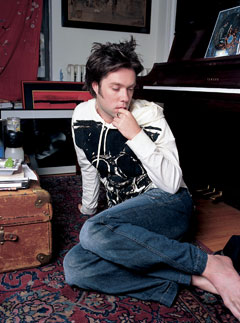


From his critically acclaimed 1998 debut album to his most recent Dreamworks release, Want One, Rufus Wainwright has revealed himself as a confident, articulate young singer/songwriter/pianist with roots in French chanson, romantic piano music, and the folk music of the past half-century.
"I draw from many different influences," reflects Wainwright. "Classical music, French stuff like Serge Gainsbourg or Jacques Brel, a lot of folk music like Doc Watson, Bob Dylan, and Woody Guthrie. And the music of both my parents has definitely influenced me a lot-especially in terms of transLating emotions into a succinct language that other people can understand. I think that my family has a certain difficulty in getting our messages across to each other on a personal level, and we really do require music in order to voice those feelings. So I guess I learned to confuse songs with raw emotion."
When you see a Yamaha, you know what to expect. They're really, really great for pop music.
Wainwright is the son of folk icons Loudon Wainwright III and Kate McGarrigle. Raised in Montreal by his mom, Rufus grew up surrounded by song. He started playing piano at age six, and by thirteen he was touring in the family band with his mother, his aunt Anna McGarrigle, and his sister Martha.
Rufus composes primarily on the keyboard. "Basically," he explains, "I have a three-pronged songwriting system. One group of songs tends to have complicated accompaniments-those are definitely piano songs. Examples from the latest record might include 'Foolish Love' or 'Dinner at Eight.' Then there's another kind of song where I just bang out chords on the piano and sing along. With those, I'll often remove the piano altogether and put in an electric guitar or whatever instead, even though the songs originate with pianistic kinds of chord changes. Then there are the songs I write with guitar, where I tend to just strum along. Those songs are usually the simplest, because I don't know the instrument as well. Actually, I find that useful-sometimes it's good not to know too much!"

On Want One, the first half of a two-album project, Wainwright displays his classical influences more strongly than on past releases. "Classical music is the language I speak, and it's mostly the kind of music I listen to," he says. "Art songs by Schubert and Schumann. Lots of Berlioz and Richard Strauss. It's great having the opportunity to express my love of classical music on the Want sessions. with Marius Devries, it was the first time I've walked into a producer relationship where that was agreed upon. on my earlier records, I think my classical leanings were viewed dubiously by producers. Maybe now it's a little more in fashion, but at the time it was very out of style. Sometimes I wish I could hypnotize myself to get into the nitty-gritty of the pop world, but my ear is addicted to these types of chords."
As a player, Wainwright tends to stay with the original structure of his compositions rather than improvising extensively. "My style of piano is very deliberate and thought-out," he says. "Basically, I play the same thing every time. The approach is closer to German Lieder than to, say, gospel music."
In Wainwright's opinion, luck plays a big part in getting great piano sounds-and great performances-in the studio. "If it's the right day with the right mic and the right air temperature and the right emotion, it just sort of happens. I'm pretty good at playing piano, so I can usually play according to what the instrument can produce. But every piano tends to be different." Wainwright is no recent convert to Yamaha pianos. "I grew up with a Yamaha baby grand, which I played from the time I was big enough to climb up on the stool," recalls Rufus. "Today I own several Yamahas. At my house, I have an upright with the Disklavier system, which I love. it's great, because it helps me remember all the little ideas and fancies I come up with. And I love touring with Yamahas-they're definitely the most reliable and nicest-sounding instruments. When you see a Yamaha, you know what to expect. They're really, really great for pop music."
What can we expect from Want Two, due out this spring? "It's less personal, and more about the dark world we live in," says Wainwright. "The project wasn't originally intended to be split into two parts, but I had a tremendous sense of urgency to get this music out, due to some personal things that were going on, and the war, and so forth. In general, since 9/11, I've had such a sense of 'make music and get it out there, because the world needs healing.'"
























